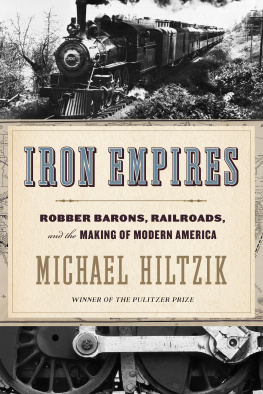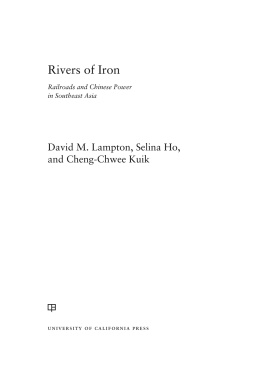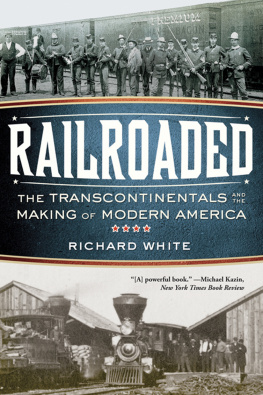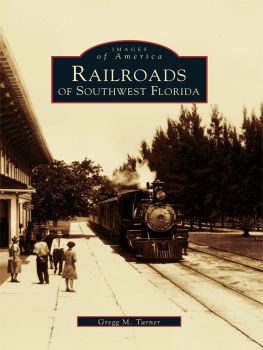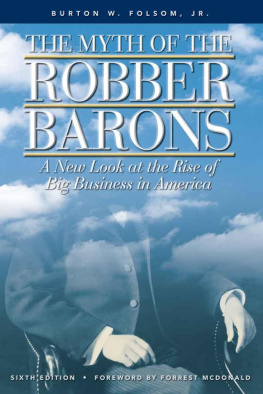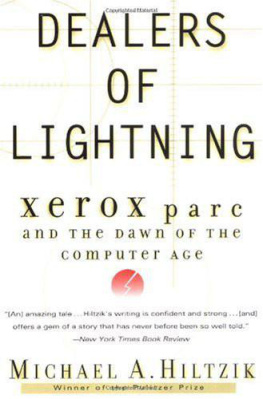Michael Hiltzik - Iron Empires: Robber Barons, Railroads, and the Making of Modern America
Here you can read online Michael Hiltzik - Iron Empires: Robber Barons, Railroads, and the Making of Modern America full text of the book (entire story) in english for free. Download pdf and epub, get meaning, cover and reviews about this ebook. year: 2020, publisher: HMH Books, genre: History. Description of the work, (preface) as well as reviews are available. Best literature library LitArk.com created for fans of good reading and offers a wide selection of genres:
Romance novel
Science fiction
Adventure
Detective
Science
History
Home and family
Prose
Art
Politics
Computer
Non-fiction
Religion
Business
Children
Humor
Choose a favorite category and find really read worthwhile books. Enjoy immersion in the world of imagination, feel the emotions of the characters or learn something new for yourself, make an fascinating discovery.
- Book:Iron Empires: Robber Barons, Railroads, and the Making of Modern America
- Author:
- Publisher:HMH Books
- Genre:
- Year:2020
- Rating:4 / 5
- Favourites:Add to favourites
- Your mark:
- 80
- 1
- 2
- 3
- 4
- 5
Iron Empires: Robber Barons, Railroads, and the Making of Modern America: summary, description and annotation
We offer to read an annotation, description, summary or preface (depends on what the author of the book "Iron Empires: Robber Barons, Railroads, and the Making of Modern America" wrote himself). If you haven't found the necessary information about the book — write in the comments, we will try to find it.
Iron Empires: Robber Barons, Railroads, and the Making of Modern America — read online for free the complete book (whole text) full work
Below is the text of the book, divided by pages. System saving the place of the last page read, allows you to conveniently read the book "Iron Empires: Robber Barons, Railroads, and the Making of Modern America" online for free, without having to search again every time where you left off. Put a bookmark, and you can go to the page where you finished reading at any time.
Font size:
Interval:
Bookmark:
Copyright 2020 by Michael Hiltzik
All rights reserved
For information about permission to reproduce selections from this book, write to or to Permissions, Houghton Mifflin Harcourt Publishing Company, 3 Park Avenue, 19th Floor, New York, New York 10016.
hmhbooks.com
Library of Congress Cataloging-in-Publication Data
Names: Hiltzik, Michael A., author.
Title: Iron empires : robber barons, railroads, and the making of modern America / Michael Hiltzik.
Description: Boston : Houghton Mifflin Harcourt, 2020. | Includes bibliographical references and index.
Identifiers: LCCN 2019033911 (print) | LCCN 2019033912 (ebook) | ISBN 9780544770317 (hardcover) | ISBN 9780544770348 (ebook)
Subjects: LCSH: RailroadsUnited StatesHistory19th century. |IndustrialistsUnited StatesHistory19th century. | Capitalists and financiersUnited StatesHistory19th century. | Big businessUnited StatesHistory19th century. | United StatesEconomic Conditions18651918. | United StatesHistory18651921.
Classification: LCC HE2751 .H425 2020 (print) | LCC HE2751 (ebook) | DDC 385.0973/09034dc23
LC record available at https://lccn.loc.gov/2019033911
LC ebook record available at https://lccn.loc.gov/2019033912
Cover design by Brian Moore
Cover photographs: Bettmann / Getty Images (train);Smith Collection / Gado / Getty Images (map); Robert Alexander / Getty Images (wheels); Shutterstock (paper)
Author photograph Amy Myers
v2.0720
For Deborah, Andrew, and David
F OR TWO WEEKS in deep summer, westbound passengers on a Union Pacific train encountered a tubercular Scot whose conversation, dripping with literary grandiloquence, had earned him the nickname Shakespeare. Pale, thin, and wracked by coughing fits, he seemed not long for this world. Generally he could be found seated at one end of a car, propping open the door with his foot as though hoping the rush of air might soothe his unremitting fever.
It was 1879, a mere decade after the Union Pacific and Central Pacific lines had met at Promontory Summit in what was then Utah Territory, completing the first transcontinental railroad. The passenger was Robert Louis Stevenson, at twenty-eight still several years shy of the worldwide fame he would acquire with the publication of Treasure Island in 1883 and Kidnapped and The Strange Case of Dr. Jekyll and Mr. Hyde in 1886. An object of pity among his fellow travelers and occasional abuse by railroad personnel, he would mine the journey for an account of rail travel as seen from the lower depths, published in 1892 as Across the Plains.
Stevensons fellow travelers were emigrants, lured west by lavish propaganda in which the railroads promised them access to the bounty of the plains and the golden riches of distant California. According to these reports, the climates of Minnesota and Montana were endowed with the power of healing any malady. The Northern Pacific declared that prosperity, freedom, independence, manhood in its highest sense, peace of mind and all the comforts and luxuries of life are awaiting you. The Union Pacific predicted that a $50 lot may prove a $5,000 investment.
The first thing Stevenson noticed upon embarking on his transcontinental trip was the contempt with which railroad personnel treated the emigrants (not excepting himself). They herded the passengers like cattle into plain wooden cars that had all the creature comforts of packing crates, equipped with benches too short to accommodate anyone but a small child, and lamps that shed but a dying glimmer even while they burned. Dining cars still being almost unknown on American railways, the train would stop at intervals for the travelers to take their meals at trackside hostelsand often stole away without even a whistle blast of warning. You had to keep an eye upon it even while you ate, Stevenson reported.
Stevenson described his companions as mostly lumpish fellows, silent and noisy, a common combination. Their conversation ran upon hard times, short commons [the scarcity of food, water, land for farming], and hope that moves ever westward. The one sentiment they all seemed to share, which Stevenson judged the most stupid and the worst, was scorn for the Chinese passengers, who were sequestered in their own car. Stevensons compatriots, mostly immigrants of European descent like himself, harbored the conviction that it was the Chinese waggon, and that alone, which stank. In truth, he wrote, as the train made its way west the atmosphere in the others became steadily more rankthe Chinese car was the exception, and notably the freshest of the three.
Along the way there were indications that for the passengers, the benefits of the westbound journey might fall short of what they had been promised: Trains as crowded as their own were passing them, headed back East. At every platform where they met, eastbound passengers cried to them through the windows in a kind of wailing chorus, to Come back. On the plains of Nebraska, in the mountains of Wyoming, it was still the same cry, and dismal to my heart, Come back!
But there was to be no turning back, for the railroads had already etched themselves into the American landscape and American culture.
That had become clear after the momentous meeting at Promontory. In 1871 Charles Francis Adams Jr., then Americas most perceptive analyst of this new industry, had described the transformation underway. Here, he wrote, is an enormous, an incalculable force practically let loose suddenly upon mankind.
A muckraking journalist and politician, the grandson of one US president and great-grandson of another, Adams perceived that the burgeoning industry would exercise all sorts of influences, social, moral and political; precipitating upon us novel problems which demand immediate solution; banishing the old before the new is half matured to replace it; bringing the nations into close contact before yet the antipathies of race have begun to be eradicated; giving us a history full of changing fortunes and rich in dramatic episodes. The railroad, he concluded, would be the most tremendous and far-reaching engine of social change which has ever blessed or cursed mankind.
As Adams foretold, the railroad industrys influence would penetrate every corner of American life, bringing ever more change to a country that, at the moment when the driving of a ceremonial golden spike marked the transcontinental railroads completion, was still struggling to come to terms with the wrenching events of the Civil War.
In the ensuing decades, the railroads would visit upon America violent clashes among powerful entrepreneurs fighting for the prize of monopoly rights; strikes that would remake the relationship between management and labor; boom times and depressions; and stock market frenzies, panics, and crashes. Investors would be rooked, whole communities defrauded, tycoons created and others bankrupted, family fortunes established for generations and others destroyed by a single heirs folly. Cartels would be assembled and shattered, politicians suborned.
The railroads would also give American farmers and manufacturers access to lucrative new markets for their produce and goods. Hamlets would be transformed into prosperous towns, towns into thriving cities, and the vacant territories of half a continent filled with homesteaders, very like the emigrants with whom Stevenson shared his cramped traveling quarters.
IT IS TEMPTING to view the railroad as an elemental, impersonal force, driving all before it. But of course it was the creation of human beings: the surveyors and engineers who mapped out the lines routes, the laborers who cleared the terrain and laid the rails, and ultimately the business leaders whose individual personalities, ambitions, determination, and morals commanded the others fates. The most notable among the latter group were Cornelius Vanderbilt, Jay Gould, J. Pierpont Morgan, and Edward H. Harriman. Each would play his hour upon the great stage of the railroad industry, attended by a host of supporting characters. Placed end to end, so to speak, they formed a continuum that for more than four decades, from the Civil War through the first years of the twentieth century, transformed Americas railroads from a patchwork of short lines waging constant self-destructive war with one another into a titanic enterprise that could justly be considered Americas first big business.
Font size:
Interval:
Bookmark:
Similar books «Iron Empires: Robber Barons, Railroads, and the Making of Modern America»
Look at similar books to Iron Empires: Robber Barons, Railroads, and the Making of Modern America. We have selected literature similar in name and meaning in the hope of providing readers with more options to find new, interesting, not yet read works.
Discussion, reviews of the book Iron Empires: Robber Barons, Railroads, and the Making of Modern America and just readers' own opinions. Leave your comments, write what you think about the work, its meaning or the main characters. Specify what exactly you liked and what you didn't like, and why you think so.

